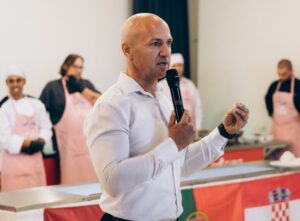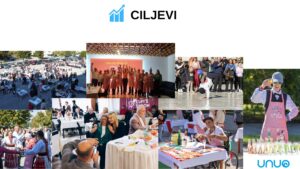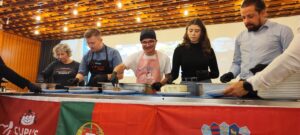This is an education that goes beyond traditional theory – learning is achieved through work, experience, and togetherness.
We are still among the few in Europe in the field of working with persons with disabilities through the art of gastronomy. While most associations specialize in working with users who have a specific, same type of disability, at the Udruga UNUO we foster an inclusive approach – working with users of various types of disabilities without distinction, says Vedran Habel, President of Udruga UNUO, for Diplomacy&Commerce.

- Udruga UNUO was founded in 2009 with the aim of empowering persons with disabilities, children without adequate parental care, and children and youth in vulnerable situations. How do you specifically support these groups?
Udruga UNUO bases its mission on a concrete and practical approach – through the art of gastronomy, we provide users with tools that enable them to acquire skills necessary for independent living and active participation in the labour market. Through interactive and educational workshops, we offer users the opportunity to discover their own talents, develop skills, and become empowered for employment, especially in the hospitality and tourism sector. This sector offers a wide range of job opportunities, the possibility of adapting the work environment, and – which is particularly important for our users without parental care – often provides accommodation and a hot meal, which can be crucial for their transition to independent living.

- What would you highlight as your goals, mission, and vision?
Our goals are
To increase the visibility of persons with disabilities and raise global awareness of their abilities among citizens, policymakers, and potential future employers.
Our mission is:
To inspire persons with disabilities every day and encourage their inclusion in society and the workforce through our projects!
Our vision is
To promote inclusion from Europe to the world through the first European culinary competition for persons with disabilities – CUPI’S SPOON – a global gastronomic competition that celebrates inclusion and talent across six continents.
- What makes you special and different is that you help those in need through the art of gastronomy. What does that actually mean in practice?
At Udruga UNUO, we truly believe that gastronomy can be much more than food preparation – it can be a powerful tool for empowerment and inclusion. Over the years, we have developed an innovative teaching methodology and specialized technology adapted to people with different types of disabilities, making the learning process accessible to everyone, regardless of their challenges. Equally important to us is educating business owners and their employees – to teach them how to properly communicate with and work alongside persons with disabilities, thereby building a bridge between our beneficiaries and the actual labour market. What makes our methodology unique is the multisensory approach we apply in food and beverage preparation. Through touch, smell, taste, hearing, and sight – our participants learn in a creative, intuitive, and emotionally powerful way. This is precisely what makes gastronomy an art form and sets it apart from conventional types of education. One of the most important aspects of our work are the public performances of our users – in front of citizens, employers, and decision-makers. Through culinary competitions and other public events we organize, our participants have the opportunity to demonstrate what they know and can do. And the audience no longer sees them through the lens of disability, but through the lens of skills, effort, dedication, and potential. That’s why we always say – look at these people through the eyes of an employer. If you’re looking for an employee who is cheerful, neat, kind, strong, organized, and capable – there’s a high chance that the person in front of you has all those qualities. And you don’t necessarily have to come from the hospitality sector. What matters is that you recognize potential and give someone a chance.
For us, the art of gastronomy is our most powerful tool. And we don’t say that out of enthusiasm, but because of real, measurable results. In fact, 90% of our participants found employment after completing our program, which is the best proof that our model works.

- How do end users and intended beneficiaries perceive gastronomy? What do they cook, and how is their effort reflected (any special dishes, preparation methods, etc.)?
Our end users experience gastronomy as a kind of adventure – an opportunity for learning, self-expression, and personal growth. For many of them, the first encounter with food or beverage preparation happens through our interactive educational workshops, which makes that moment particularly meaningful. For them, gastronomy is not just a means of nourishment – it becomes a tool for gaining independence, establishing routines, and building self-confidence. We place special emphasis on training them to prepare quick and healthy meals – because that’s the foundation of independent living. We teach them how to make simple but nutritionally balanced dishes that help them feel well and stay functional in everyday life. Additionally, through various activities, we constantly remind them of the importance of togetherness – because there’s no greater joy than gathering around the table and enjoying something we’ve prepared together. Through the use of our self-developed digital educational materials, users are able to skilfully follow step-by-step instructions for preparing a variety of dishes. Whether it’s making homemade soup, bread, smoothies, cakes, or even more complex meals like risotto, everything is designed to be accessible and adaptable to their abilities. Their effort is reflected in every detail – in the way they carefully select ingredients, in the precision with which they follow instructions, and in the team spirit that develops among them. Fully aware of the importance of cooperation, we encourage teamwork, where everyone contributes according to their abilities – and always just a little bit more than that.
- Udruga organizes a large number of competitions both in Croatia and across Europe. What is your connection with similar organizations abroad, and what are the experiences of your end users?
The broad and inclusive nature of our gastro competitions is what makes them recognized beyond the borders of Croatia. An increasing number of European organizations are acknowledging the importance of our approach and are involving their own beneficiaries in our projects. Regardless of their primary focus, they all share one common goal – to give their users the opportunity to showcase their skills, gain new experiences, and feel proud of their achievements. The experiences of our end users speak louder than any numbers – when they step onto a competition stage, in the heart of their country’s capital, presenting themselves as contestants, as chefs, as creators – it becomes a life-changing moment. Each participant receives a personalized certificate of appreciation, while the most capable ones are awarded the title of national champions. But we don’t stop there – national champions are invited to Zagreb, where they undergo additional training with our professional mentors, chefs, and bartenders, and take part in the semi-final and final rounds of the competition. These gatherings are a place of learning, new friendships, and above all – the spreading of unity and a strong sense of belonging.
The highlight of the entire project comes at the end – every year, the grand finale is held at the Vatican, where the flags of participating countries are raised, and medals are awarded to the winners. However, this event is much more than just the conclusion of a competition. It is a symbol of inclusion, respect, and recognition for those who are often left at the margins of society. To us, this is not just a competition – this is a movement. A movement that is building a Europe where diversity is not a barrier, but a strength. A movement that uses gastronomy as a bridge between people, cultures, and opportunities.

- You are a professional chef with nearly 30 years of experience. You have cooked for the former presidents, Kolinda Grabar-Kitarović and Stjepan Mesić, turned down numerous well-paid offers from abroad, and decided to help people with disabilities. How much does your work mean to you personally, and what is your message to all those who can help those in need in their own way?
As a professional chef, I can say that I have achieved all my professional goals – I’ve cooked for presidents, worked in top restaurants and hotels, and had the opportunity to work abroad under conditions that many dream of. However, despite all of that, at one point, I felt a sense of emptiness. When I started working as a culinary teacher for adult education, I realized that my knowledge, although professional, was not enough. In my first workshops with people with disabilities, such as the deaf or blind, I can honestly say I felt defeated. I didn’t know how to approach them, how to teach them, or even how to communicate. I realized I had to start learning again – but not from books, from them. That’s when I founded the association. I gave myself five years to learn – by listening, observing, and trying to understand their needs. On weekends, during holidays, I even hosted young people with various disabilities in my family. While living with them, I saw something that changed me forever – their memories of tastes, smells, colours, and emotions tied to food were incredibly strong. Although they would forget the names of my family members, they would remember the entire process of preparing a dish very precisely. I realized that gastronomy was their language. Words cannot describe how much this work means to me. It is not just a job or helping – it is my life’s mission. Every educational moment, every competition, every smile on their face when they prepare their first independent meal – that’s what drives me. I want to thank all the people with disabilities who have given me the opportunity to work with them, to learn from them, and together, build a society that does not know differences, but recognizes potential. My message to everyone is simple – we can all help, and we should. Sometimes it’s enough just to give an opportunity, lend a hand, or open a door. And believe me, every citizen should at least have a basic culture and empathy in dealing with people with disabilities. Because the truth is – each of us will one day become a person with a disability. What we will need then is exactly what we can offer today – understanding, respect, and support.